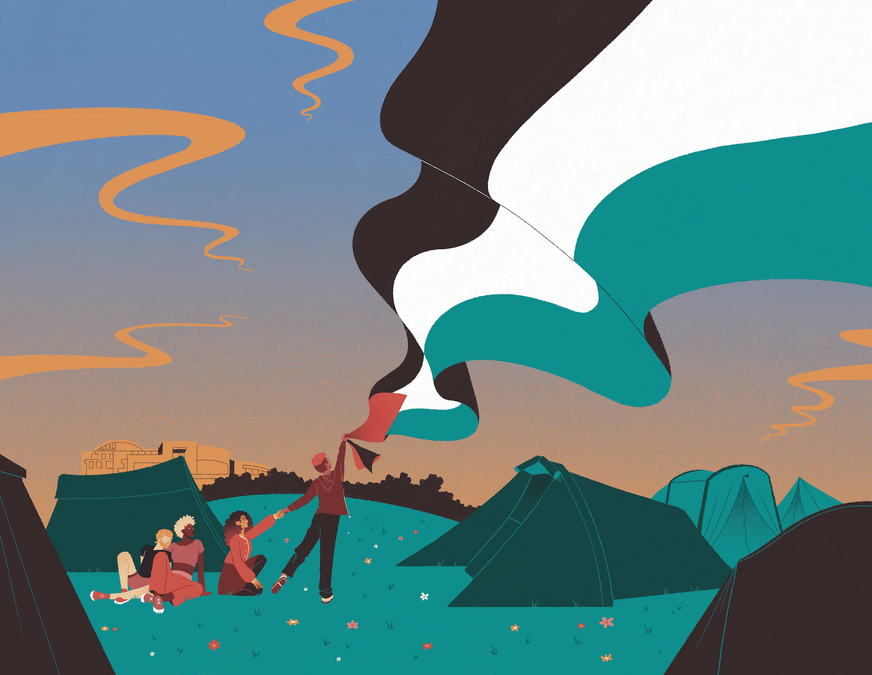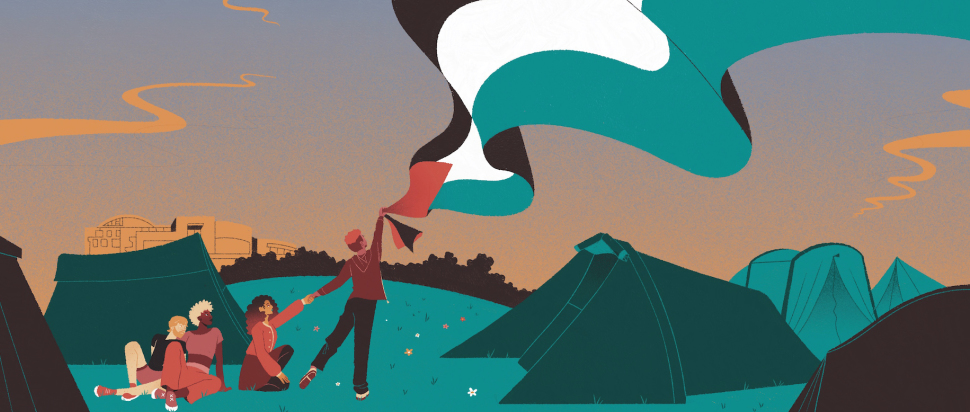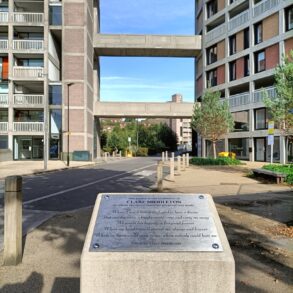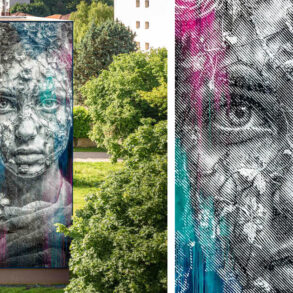Our grief has been stretched in all directions over the past eight months. As the days and months unfolded a genocide in front of our eyes, we have all, from afar, been forced to expand what it means to grieve. As the bombs continue to drop across Gaza, this grief grows. As a man-made famine is happening, this grief grows. As our institutions and governments act immorally and inhumanly, this grief grows. As mass graves are found in hospitals; as every university in Gaza is destroyed; as culture, archives, and community are under the rubble; as exile and dispossession become a way of life; as death becomes the norm in Gaza – this grief grows.
This grief has become an everyday feeling. Every day we assume that we have reached the extent of how we can grieve, but it is always exceeded. I say ‘we’ because this grief has become a collective experience in the public psyche. A shared space of disbelief. In western societies grief is expressed as an individual experience. To grieve in the west is to do it alone – in isolation, solitude, and introspection. But what happens when our grief becomes a collective experience? Grief, in itself, is love and energy untethered from an earthly place, released and unbounded. What happens when collectively we gather and harness this untethered love and energy towards something more?
At the end of April, my comrades and I gathered together in grief to take the lawn outside of the Scottish Parliament in protest of the Scottish government’s complicity in the genocide in Gaza. Scotland-based arms factories – such as Thales – continue to send weapons and parts to Israel. Meanwhile, as noted by the Time to Divest campaign, many Scottish Local Authority Pension Funds currently invest in companies who directly profit from weapons used in Israel, such as BlackRock. We wanted to resist Scotland’s inability to act on their hollow words of solidarity. Through our grief we acted. We acted against the tides of order to express the grief of injustice, to express the truth we saw in Palestine, to express the love we have for Palestine.
Our grief had to transcend spoken solidarity, which has now become the norm in protesting for Palestine. Collectively more needed to be done. Chanting was no longer enough, wearing keffiyehs was no longer enough. Our grief unveiled a path outside of the world we existed in, allowing us to create our own world – even if small and temporary.
 Driss Chaoui” alt=”Illustration of a group of people sitting by tents; one stands, holding a large Palestinian flag.”>
Driss Chaoui” alt=”Illustration of a group of people sitting by tents; one stands, holding a large Palestinian flag.”>
Illustration by Driss Chaoui
We created our own world of how people living together in liberation could exist. Through occupying, we metamorphosed what these spaces could be used for, transforming them into spaces to act through grief and towards divestment and liberation. This showed us the immediacy in which we can demand for action, not only from the Scottish Parliament, but also from the University of Edinburgh’s Old College, with a second camp now based there. These camps function as a day to day form of resistance. Together we sleep, eat, and strategise what we can do next to resist genocide. The camp gives us the space to learn and act. Through educational workshops, teach-ins, group dinners, and grief circles, we are able to form a radical community. This space has allowed us to live fully within our actions, our politics, and our ethics.
This immediacy to act saw many of us decide to embark on a hunger strike. We are currently going into our third week of hunger strike. Individuals swap at the end of each week, passing the hunger strike to the next group, in hopes that the longevity of our hunger strikes will put pressure on the government and university to act with the same immediacy that we are striking with. For months, we have been shouting for justice. For months, we have been organising against this genocide. Yet, for months, these complicit institutions have not changed their ways. Because of their inaction, we have had to escalate our action.
A silence grew from the overextended grief. This silence grew because the reality of Gaza became too much to express in words. In hunger strike, we have found a way to scream, grieve, and act through this silence and in solidarity with Palestinian people who are now experiencing famine and genocide. It has become a way that we can protest from the depth of our soul and see what is happening in Palestine, while being inspired by the courageous Palestinian prisoners who use hunger strikes to protest within Israeli prisons.
By protesting with our bodies we want to show these institutions – the university and government – the extent of our grief. Within both the camps and our hunger strike, we want these institutions to join us in our grief. Grief can only push us towards a future. A future with justice, ethics and humanity. A future with divestment, which our universities can enact now, if they grieve alongside us.
To grieve for Palestine is to be consumed by the need for justice. To grieve for Palestine is to act. To grieve for Palestine is to love. Our protest is a reaching hand to these bodies of power, inviting them to grieve with us. So that in this collective grief, we can all act towards a more liberated future for Palestinians and for all oppressed people.
This post was originally published on this site be sure to check out more of their content.









